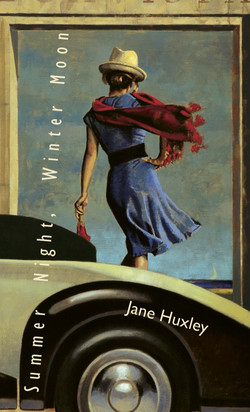Читать книгу Summer Night, Winter Moon - Jane Huxley - Страница 13
На сайте Литреса книга снята с продажи.
SEVEN June 16, 2005
ОглавлениеI rushed out of my home as if I were leaving a spook house. Couldn’t get away fast enough. But outside the headlines were vociferous.
REGENT’S PARK MYSTERY: SUICIDE OR MURDER? MISSING LOCAL RESIDENT LAST SEEN IN PARK. FEW CLUES IN WOMAN’S DISAPPEARANCE. TRAIL DEAD ENDS AT BRIDGE.
However fast I walked the headlines followed. High street, low street, back street, side street, fuck-you-all street. I kept my head bent and my eyes down, a j’accuse glaring at me from every photograph, article, description, assumption.
But it was not difficult to escape the newspaper-hawkers. It meant drifting into Regent’s Park, forest-green and fluttery, the sunshine reflected on the puddles after the rain had stopped.
I had not prepared myself for the shock.
He was the last person I expected I would see standing a few feet away, leaning against the rail atop the parapet of York Bridge, gazing at the water as the sun went down. What the hell did he expect to find there?
“Hello, Dante.”
Though he turned away when he saw me, he did not seem surprised that I had materialized and was standing beside him. Tired, dishevelled, there seemed to be a mixture of fury and frustration about him, his longish dark hair tangled, untidy, his eyes both feverish and elusive. For once, his ever present camera was not slung over his shoulder. I was sickened that such distress could not be shared, that the candour of our lifelong friendship had to be scraped, like a tumour, out of existence.
“Doesn’t make sense,” Dante said, searching the water, which tonight resembled a marshy creek. “I don’t believe she jumped.”
I nodded and peered down at the stream, a man-made waterway that got filled with water from the mainland. I had read somewhere that the depth of this narrow channel was just over two metres and that the bottom was made of puddle clay, hard as concrete. At this juncture the water was moving rapidly, trailing wisps of debris – leaves, feathers, twigs, the odd plastic bag.
“The police think she may have just wandered off,” I said. “Amnesia, or something.”
The silver maples, budding above his head, fluttered and dropped two reddish florets onto his hand. He stared at them and in a touchingly awkward gesture slipped them into the pocket of his jacket.
“Did she ever tell you…” he began, at last raising his head to look at me, “…that someone might be stalking her?”
“Why would anyone be after her?”
“A homeless guy, a lunatic, a pervert.”
“The dog would have found his way home, wouldn’t he?”
“Yeah… shit, Trev, I don’t know.”
“I’m not saying it’s impossible, Dante, but I doubt it. This is London, not Rwanda. It doesn’t make sense, even if you look at it from all unexpected angles, except –”
“Except what?”
“Depression.”
I saw in his face a look of uneasiness, as if he were about to shoulder an awful burden. “Antonia didn’t seem her cheerful self lately, did she?” he acknowledged wearily.
“Not at all.”
“She was depressed. That’s your explanation?”
“Her behaviour was weird.”
“In what way?”
“She had lost weight. Seemed restless. Exhausted at night, not interested in sex. I got the feeling, whenever she left the house, that she might not come back.”
“God! Moody I can understand. But depressed? That’s serious, isn’t it?”
I did not agree or disagree. I waited for him to sort out his thoughts and wrestle with his conscience.
“You think she… she just wandered off?” he asked.
“Don’t know what to think, Dante. I’m trying to persuade myself that there is a logic to all this. Sometimes irrational behaviour has a logic of its own.”
But he refused to be mollified by an abstract morsel of philosophy and bluntly said, “I got a call from an Inspector Freeman, or Felman, or –”
“Fielding,” I told him.
“Anything to do with your visit yesterday to the police station?”
“Probably.”
“Well, this guy thinks he’s a bloody genius. But he hasn’t found her, has he?”
“Obviously not.”
“What about you? What are you doing to find her?”
“A lot more than showing up at this bridge and asking dumb questions. I’ve been to interviews with the police, the investigators, anyone who may –”
At that moment the pair of swans appeared, haughty and magnificent, gliding next to each other to remind me of a tableau which had already been staged, performed. But not all the details were the same. Tonight there was no moon, only a silvery flicker behind the thickening clouds. And the water was grey, for the so-called blue-green algae which had struck certain streams seemed to have cleared. Now the swans were slashing the water outwards into broadening ripples as they displayed their arrogant heads.
“That stinking slush is gone,” Dante said, pointing at the water. Then, ignoring our angry exchange, he asked, “What do you think happened to Antonia?”
I put both my hands on the railing and struggled to hold my rage captive. Unseen. Unheard. And yet I was just as disturbed to feel my fury beginning to subside. I was never more lucid than when confronted with rage. Unlike others, who became erratic and confused, rage made me aware of the imperatives, prevented me from backing off.
“I think she left,” I said.
“Without saying good-bye?”
“Walking out speaks volumes, don’t you think?”
“Not in her case. She’s clearheaded and sensible. Never struck me as irresponsible.”
“She has been unhappy for a long time.”
“Didn’t leave a note, didn’t take a goddamn thing –”
“She took the dog.”
He nodded, visibly upset. Antonia’s walking out and taking the dog with her presented him with an equation he was unable to explain.
